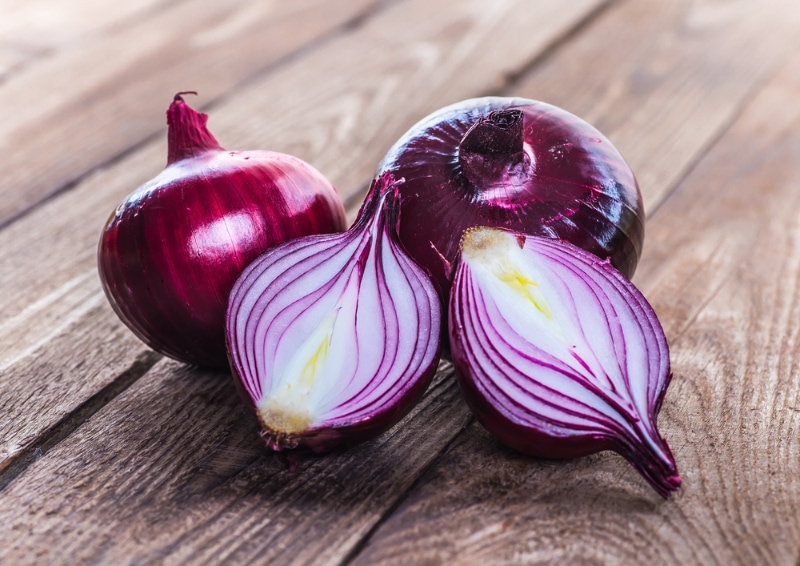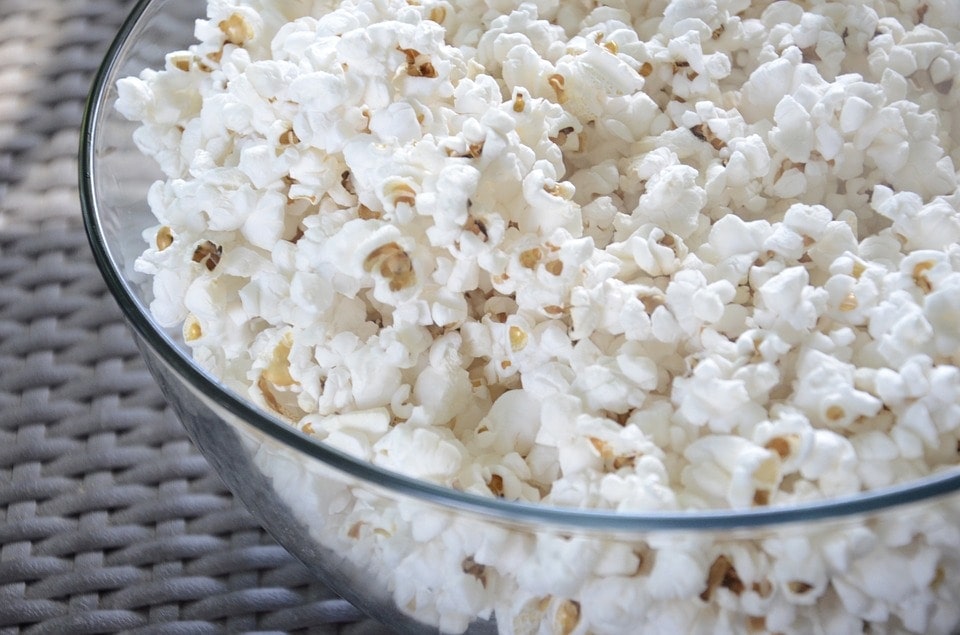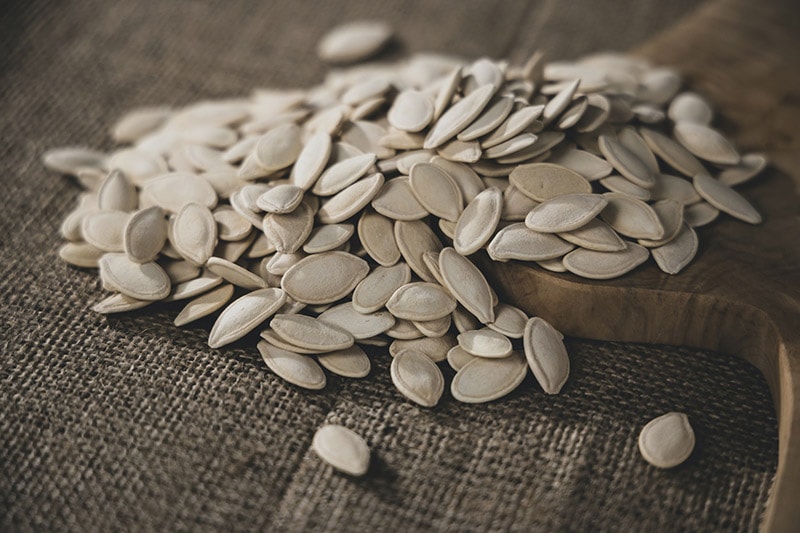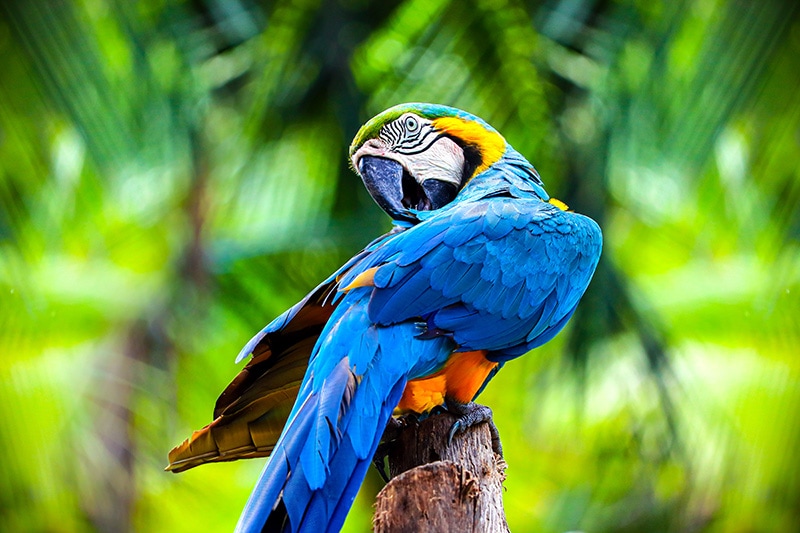Can Parrots Eat Onions? Vet-Approved Facts & FAQ

Updated on

Onions are considered a healthy addition to a human diet, but they are toxic to birds as well as to cats and dogs. Therefore, whatever species of parrot you have, from Parrotlet to Macaw, you should not feed them onions. Similarly, other members of the allium family, which includes garlic and leeks, too, are considered toxic for birds.
These vegetables contain sulfur compounds that are released into the blood when the plant is chewed and digested, and these can cause serious illness even when consumed in small amounts.
The Dangers of Onions
Onions are not only healthy for humans but are considered highly nutritious. They can help control blood sugar levels and help combat inflammation. But what’s good for us isn’t necessarily good for our birds, and this is certainly the case when it comes to the consumption of onions.
Onions contain sulfur compounds which cause blood cells, which are responsible for carrying oxygen around the body, to be destroyed. And because oxygen is not getting to the organs, the resulting anemia (red blood cell deficiency) can cause organ damage and, eventually, organ failure.

Signs of Onion Toxicity
The lack of oxygen to the organs will initially present as lethargy and tiredness. If your otherwise lively parrot is being quiet and not wanting to fly or hop around after eating onions, they could be suffering from anemia.
What to Do If Your Bird Eats Onion
If your bird has eaten onion or another allium, the first thing to do is to contact an avian vet. An avian vet will have better knowledge of how to treat the condition in birds. Treatment will vary depending on how much onion was ingested, the time of ingestion, and whether your bird is showing any signs of anemia. Call your veterinarian for advice, and follow all their instructions for the best outcome for your bird.
What Else Should Parrots Avoid?
As well as fresh onion, ensure your bird does not eat onion powder. Onion powder is highly concentrated, so it takes even less of the powder to cause illness. Birds are small, so a little powder in human terms can cause big problems.
All parrots should avoid eating any species in the allium family. As little as a quarter of a clove of garlic, and even less powder, could be enough to lead to serious anemia. Other alliums to avoid include leeks and shallots.
Avocado contains Persin, which is toxic to birds, leading to heart problems. Even just a few grams of avocado flesh can be fatal for a small parrot, such as a budgerigar.
What Should Parrots Eat?
Different species of parrots have different dietary and nutritional requirements, but, as a general rule, parrots eat a combination of grains, seeds, nuts, fruit, berries, insects, vegetables, and some leaves and other greenery. Pet parrots are usually given a diet consisting of pellets, supplemented with fresh fruit and vegetables and other treats. Some species, like Macaws, need a higher-fat diet and these will eat more nuts than other birds. However, you should research the specific species of parrot you have to determine the ideal diet.
Top Treats for Parrots
What’s healthy for one parrot is not necessarily healthy for another, so you should research to find out which treats are best for your particular species. Or better yet, speak to your veterinarian for advice tailored to your bird. Keep in mind that these treats should always be a small part of their diet.
1. Plain Popcorn
Ensure the popcorn does not have any salt, sugar, or other additives, ideally by making it yourself when it’s treat time.

2. Raisins
Lots of dried fruits are safe for parrots, but they do tend to contain more concentrated levels of sugar than the fresh varieties. Raisins make a great addition to homemade parrot snack bars. Avoid any that have been sweetened. And only feed these as a treat.
3. Pumpkin Seeds
High in protein, and also containing magnesium, iron, and potassium, pumpkin seeds are safe for parrots in moderation, and are tasty, but they are almost 50% fat, making them suitable only as an occasional treat.

4. Plain Nuts
Parrots love nuts, and while you may need to feed smaller breeds shelled nuts, large parrots will especially enjoy being given nuts still in their shells. Breaking the shells and prying the nuts out will keep your bird entertained and fulfilled. Nuts are another great addition to healthy homemade snacks, but they should only be given as occasional treats because they are high in fat.
Macaws, because of their high-fat dietary requirements, can eat more, but nuts should never be given as a primary food source.
5. Apple
You should peel the apple to get rid of the skin and any pesticides it may contain, and do not feed any of the core or seeds which naturally contain cyanide-forming compounds, but the rest of the apple flesh is a healthy snack for parrot species.
Conclusion
Parrots are inquisitive birds that have a surprisingly big appetite. They will typically want to investigate what is on your plate, in your hand, or even in your mouth. As such, it is not uncommon for them to try and steal morsels of food. While this is okay with some foods, you should not let your parrot steal and eat onions or other members of the allium family like garlic or shallots.
These are toxic to parrots, as well as other pets including cats and dogs. Onions can cause anemia which, in turn, can cause organ failure and may even have a detrimental effect on the parrot’s heart.
Featured Image Credit: rotozld, Pixabay












